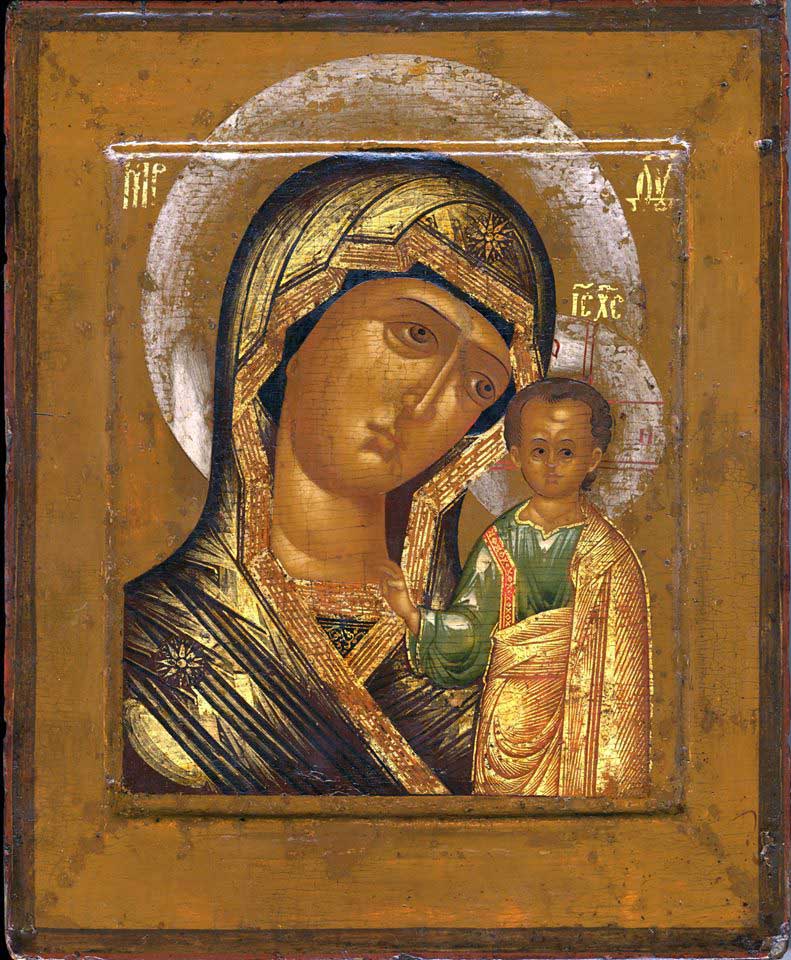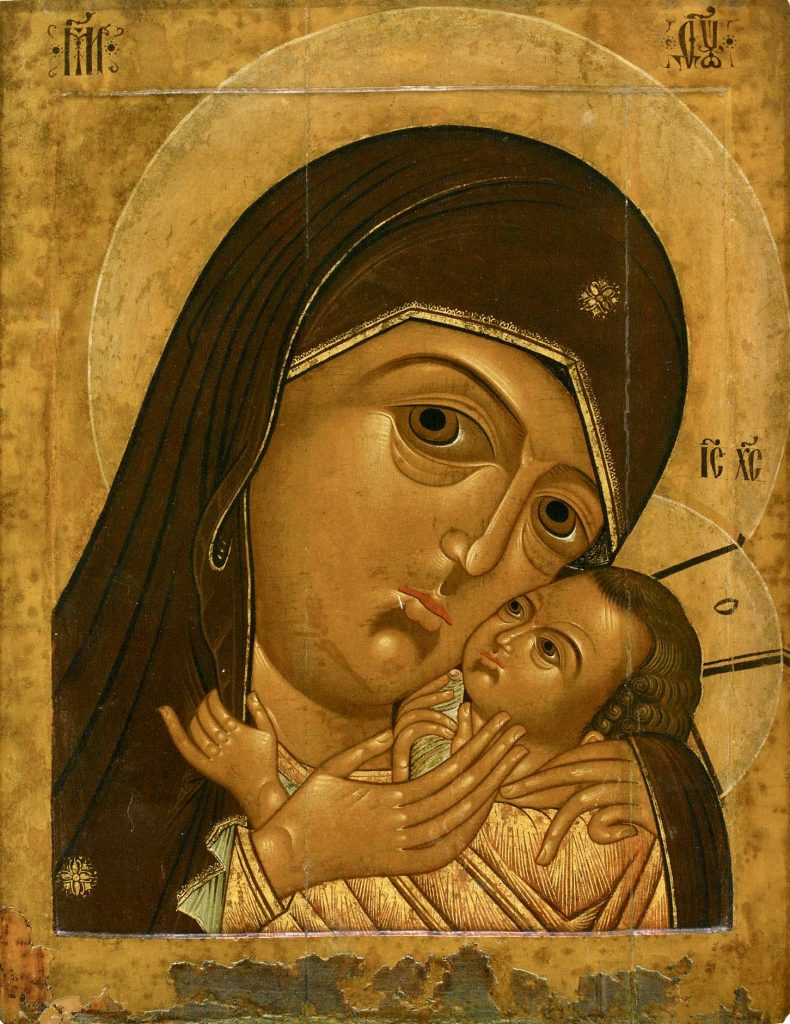A Supplicatory Canon to the Most Holy Theotokos

Ode I, Irmos: Come, O ye people, * let us sing a song to Christ our God, * Who divided the sea, * and made a way for the nation * which He had brought up out of the bondage of Egypt; * for He hath been glorified.
Most Holy Theotokos, save us.
The discourse granted me is in nowise capable of hymnody, О all-pure one, for the darkness of my sins doth cover me; yet accept my limitations, О Birthgiver of God.
Most Holy Theotokos, save us.
I finally flee from my countless sins to thy protection, О most pure one. Render our God and Master easily reconciled with me, and save me, О pure one.
Glory be to the Father, and to the Son, and to the Holy Spirit.
Thou art my fervent mercy-seat, Lady, and, fleeing to thee, I am saved and obtain salvation of soul; for thou canst do all things, in that thou art the Mother of the God of all.
Now & ever, and unto the ages of ages. Amen.
The deceiver of souls hath lured me into the pit of destruction; but stretch forth to me thy mighty hand, О Virgin Theotokos, and quickly lead me up to the light.
Ode III, Irmos: O Lord, who didst slay sin upon the tree, * firmly establish us in Thee, * and in the hearts of us who hymn Thee * plant the fear of Thee.
Most Holy Theotokos, save us.
Having fallen among many thieves, wretch that I am, I have been stripped naked, wounded and left for dead; but disdain me not, О pure Theotokos.
Most Holy Theotokos, save us.
The serpent who wrought deception through the tree stripped Adam naked, and hath now easily made my soul captive. Yet I entreat thee, О Lady: Have pity on me!
Glory be to the Father, and to the Son, and to the Holy Spirit.
I now bring my secret deeds before thee, my true intercessor and protection, that thy Son may not denounce me with them at His righteous judgment.
Now & ever, and unto the ages of ages. Amen.
Have mercy, О pure one, have mercy, for we derive no salvation from our deeds. Wherefore, with ardent faith we cry out to thee: Have mercy upon thy servants!
Ode IV, Irmos: I hymn Thee, O Lord, for I have heard report of Thee, * and I was afraid; * for Thou comest to me, seeking me who am lost. * Wherefore, I glorify Thy great condescension towards me, * O greatly Merciful One.
Most Holy Theotokos, save us.
Disdain me not who am incurably ill and infirm, О Lady; but grant unto me the oil of thy goodness, О Virgin, and enrich me with thoughts of thee, as with incorruptible gold from God.
Most Holy Theotokos, save us.
I have been stripped bare of all good works and lie arrayed in evils more than all who fell of old; but do thou now adorn me with good deeds and deliver me from wickedness, О Bride of God.
Glory be to the Father, and to the Son, and to the Holy Spirit.
In word and with my will, I have surpassed the harlot in fornication and the publican in usury; yet before the end grant that I may acquire the repentance of both, О Lady.
Now & ever, and unto the ages of ages. Amen.
I have dwelt in the desert of grief and have withdrawn from thee, О Birthgiver of God. Who shall give me wings, that I may fly and go to thee, my hope, who dost save me from faintheartedness, wretch that I am?
Ode V, Irmos: O Lord, Bestower of light and Creator of the ages: * guide us in the light of Thy commandments, * for we know none other God than Thee.
Most Holy Theotokos, save us.
In that the never-waning Light shone forth from thy womb upon those on earth, О Lady, illumine my fetid soul, and drive all darkness from my heart, О pure one.
Most Holy Theotokos, save us.
The cruel night of my wicked and evil deeds covereth me, O Lady; yet I cry out to thee: Guide me to the divine light of thy Son and Master, О all-hymned one.
Glory be to the Father, and to the Son, and to the Holy Spirit.
О pure one, accept me as thy Son, the Creator of all, accepted the prodigal son, for I cry out with him: I have truly sinned! Save me, О Lady!
Now & ever, and unto the ages of ages. Amen.
In that thou art merciful, О most pure one, heal thou my heart, which hath been wounded by the assaults of the evil one, for thou hast ineffably given birth to Him Who was wounded in the flesh upon the Cross.
Ode VI, Irmos: Whirled about in the abyss of sin, * I appeal to the unfathomable abyss of Thy compassion: * Raise me up from corruption, O God.
Most Holy Theotokos, save us.
I have fallen into the pit of sin and, held fast by fear, I cannot lift my gaze to our unforgettable God; yet I cast myself down before thee, О Bride of God.
Most Holy Theotokos, save us.
By thine omnipotent supplication, О Virgin Theotokos, pilot my heart, which hath been grievously covered by the waves of mine incomprehensible transgressions.
Glory be to the Father, and to the Son, and to the Holy Spirit.
In that thou art my confirmation, О Lady, grant that I may behold the beauty of thy glory when my soul shall be separated from my flesh, that I may thus know remission.
Now & ever, and unto the ages of ages. Amen.
By thy prayers to God deliver thy servants, who have recourse to thee with faith, from perils, misfortunes and sorrows, О holy Lady.
Lord, have mercy. Lord, have mercy. Lord, have mercy.
Glory be to the Father, and to the Son, and to the Holy Spirit; now & ever, and unto the ages of ages. Amen.
Sessional hymn, Tone II: We magnify thee, O Theotokos, crying aloud: * Thou art the un-burnt bush, * wherein Moses beheld as a flame ** the Fire of the Divinity.
Ode VII, Irmos: When the golden image was worshipped on the plain of Dura, * Thy three children spurned the impious command, * and, cast into the midst of the flame, * they were bedewed, and sang: * O God of our fathers, Blessed art Thou!
Most Holy Theotokos, save us.
Gaping wide, the enemy now strives to devour me, for from every quarter he brings temptations and snares to bear upon me, wholly cutting off my progress; yet anticipating my need, О Virgin Mother, deliver me from his wicked assaults.
Most Holy Theotokos, save us.
The adversary defiles and vexes my senses and mind, striving to drag me down into the pit of despair; wherefore, I cry out to thee alone: О Bride of God, my refuge, deliver me from the hands of the evil one!
Glory be to the Father, and to the Son, and to the Holy Spirit.
О my Christ Who art Thyself the Word, Who of old delivered the three youths from the furnace, by the supplications of Thy Mother who knew not wedlock, bedew me and deliver me from the flame which I have enkindled by my boundless evil deeds.
Now & ever, and unto the ages of ages. Amen.
Coming upon my material heart, the corrupter hath slain it; but by thy divine power cause rain to fall upon me, О Mother who knewest not wedlock, and grant that I may vanquish him, that I may cry out to thee with faith: Blessed art thou who hast given birth to God in the flesh.
Ode VIII, Irmos: God Who descended into the fiery furnace * with the Hebrew children, * and transformed the flame into dew, * do ye works hymn, * and supremely exalt as Lord throughout all ages.
Most Holy Theotokos, save us.
Cruelly buried beneath my many evils and weighed down by the multitude of sins, I dare not in anywise lift up mine eyes to heaven, but cry out to thee: Have mercy upon me who have fallen, О only Theotokos!
Most Holy Theotokos, save us.
I have fallen under the wrath of thy Son and God, О pure one. Deliver me, and in the hour when He shall conduct the trial, be thou my helper, О most pure one, and deliver me from standing with the goats on the left side.
Glory be to the Father, and to the Son, and to the Holy Spirit.
О Maiden Bride of God, raise me up who have been spiritually slain by my countless sins, and by thy supplication deliver me from all the deception of the soul-corrupting enemy and murderer.
Now & ever, and unto the ages of ages. Amen.
How hast thou besmirched thy pristine beauty with evil, О my incorrigible and wicked soul? How hast thou broken all thy promises to thy Creator and accepted evils? Yet go thou and hasten with piety to the Theotokos.
Ode IX, Irmos: God the Word, God of God, * Who by ineffable wisdom came to create Adam anew * after his grievous fall to corruption through eating * and Who took flesh beyond all telling from the Holy Virgin for our sake, * Him we faithful with one accord magnify in song.
Most Holy Theotokos, save us.
I have truly defiled my senses with grievous actions and am wholly filled with shameful deeds; but cleanse me, О most pure one, asking that I be granted time for goodly compunction, that I may unceasingly magnify thee.
Most Holy Theotokos, save us.
When the hidden deeds of everyone shall be revealed, О Theotokos, be my justification, since thou truly hast the power to do so, and deliver me from darkness, that by thy prayers I may dwell in the land of light, where there is ineffable joy.
Glory be to the Father, and to the Son, and to the Holy Spirit.
I beseech Thee, О Word: Before Thy final coming grant me fervent repentance, tearful compunction, chastity and humility, divine love, and a place in Thy flock, through the prayers of her who gave birth to Thee.
Now & ever, and unto the ages of ages. Amen.
О Virgin who dost surpass all noetic and material beings in glory and honour, except for God, disdain me not who have surpassed in transgressions all people, past and present, who have sinned on the earth; and by thy prayer save me.
 Dear brothers and sisters,
Dear brothers and sisters, Ode I, Irmos: Let us all chant a triumphant hymn unto God * Who wrought wondrous miracles * with His upraised arm, * and saved Israel, * for He hath been glorified.
Ode I, Irmos: Let us all chant a triumphant hymn unto God * Who wrought wondrous miracles * with His upraised arm, * and saved Israel, * for He hath been glorified.